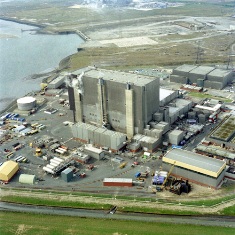British Energy (BE) said that four of its Advanced Gas-cooled Reactors (AGRs) remain offline while an issue with wire windings of boiler closure units is investigated. It has not yet said when it expects the units to return to service, which has raised concerns about winter energy supplies.
 The company said on 22 October that "an issue relating to a wire winding" was discovered at its Hartlepool 1 reactor during a planned inspection of boiler closure units.
The company said on 22 October that "an issue relating to a wire winding" was discovered at its Hartlepool 1 reactor during a planned inspection of boiler closure units.
In an AGR, eight boilers are within the concrete pressure vessel that safely contains the reactor core and potentially dangerous materials. The steel and concrete boiler closure units form part of the reactor pressure boundary and are pre-stressed with nine layers of wire windings. It is the condition of this wire that BE is investigating.
BE has also shut down its Hartlepool 2 and both Heysham 1 reactors, which share the same design of boiler closure unit. Unit 2 at Heysham 1 was undergoing refuelling when the potential problem was discovered and BE decided to postpone its return to service until the investigation and subsequent checks are complete.
The company has now announced that initial results of inspections at Heysham 1 had identified a similar issue with the wire windings, saying that "one wire has failed as a result of corrosion." BE is now inspecting unit 2 at Heysham 1, while an inspection of Hartlepool 2 will start soon.
BE said: "This is a legacy issue of the initial construction, identified during the course of baseline inspections. While this component of the plant was not originally designed to be inspected, improved technology and innovative inspection techniques have been developed which have now allowed inspection as part of the improvement programme."
It added, "We are in the process of developing the methodology to secure the return to service of the units. This is a complex issue and a timetable for the return to service of these units can only be formed when inspections and a full assessment of the situation have been completed."
Shortage concerns
British Energy is the UK's largest producer of electricity, operating eight nuclear power plants and one coal-fired plant. The company supplies about one-fifth of the UK's electricity. The shutdown of its four AGRs has removed one-quarter of its generating capacity. In addition, the company's two-unit Torness plant has been shut due to electrical faults and one of the reactors at Dungeness B is closed for routine maintenance. BE's announcement that it was unsure when the Heysham and Hartlepool units would restart sent the spot price for electricity soaring. Day-ahead electricity prices increased as much as 17% to a high of GBP47 ($99) per MWh.
Energy expert Professor Ian Fells of Newcastle University has warned that the UK faces power cuts over the coming winter and higher electricity prices if BE's reactors are not returned to service. He said that the UK has been "very close to power failure over the last couple of years - within a couple of minutes on a few occasions." Fells suggested that the UK may have to "rely on it being a warm winter."
John McNamara, spokesman for the Nuclear Industry Association (NIA), said "British Energy's engineering and maintenance standards are world-class, but they have a collection of very disparate prototypes of reactors. That presents them with a huge engineering problem." He added, "I think there is capacity in the system to ensure there isn't any effect on supply, but it is getting tighter."
Despite concerns of a lack of generating capacity, UK energy minister Malcolm Wicks said last week, "We do not face the prospect of power shortages this winter. National Grid indicates that we are going into the winter with a healthy 'safety net' of some 20% more than expected peak electricity demand." He added, "Power stations will from time to time come out of operation, but this is precisely why we have a safety margin, and why National Grid has a routine mechanism for signalling to energy companies to bring on stream additional generation to maintain it." He maintained, "There is no cause for alarm."
Further information
WNN: Aging causes grey hairs at British Energy
WNN: Areva, British energy move for new UK nuclear
WNN: Safety reviews complete for Hunterston B and Hinkley Point B







_94566.jpeg)






